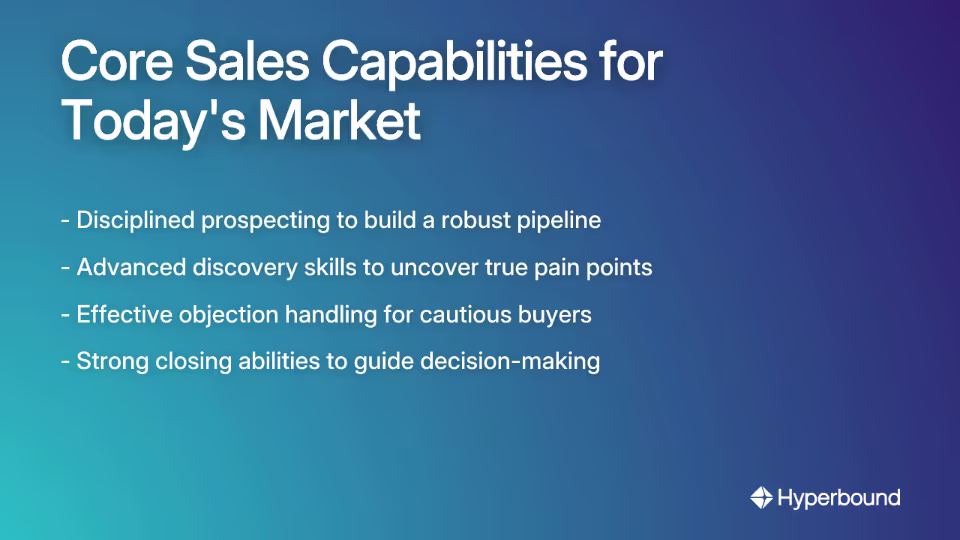
You're staring at your quarterly numbers, and they're not pretty. The pipeline is drying up, deals are stalling, and that quota seems further away than ever. That sinking feeling in your stomach grows as you wonder: Is it just me? Am I failing at this? Or is something bigger at play?
As one sales professional put it, "Every role is a gamble. I just wanted to show up, do what's asked and get paid, but that doesn't always correlate to success." When your livelihood depends on closing deals, it's terrifying to feel like factors beyond your control might be tanking your performance.
The reality? About 80% of your sales performance is influenced by external factors. But identifying which factors are holding you back is the first step toward regaining control.
This article provides a systematic framework to diagnose what's really happening with your sales performance. We'll work from the macro to the micro – from broad economic forces to your personal selling skills – helping you determine whether to adapt your approach, push for internal changes, or find a new opportunity altogether.

Reading the Room: Is It the Economy?
Before blaming yourself, assess the macroeconomic climate. Sometimes, the headwinds are simply too strong for anyone to sail against.
The End of Easy Money
"When interest rates are low, money flows like wine. But when rates rise, the economy slows down and consumer spending dries up." This observation from a veteran salesperson captures the dramatic shift we've seen in recent years.
The era of ZIRP (Zero Interest Rate Policy) is over, and businesses across B2B sectors are tightening their belts. Decision-makers who once had budget flexibility now face intense scrutiny on every purchase.
The Buyer Indecision Epidemic
According to the 2025 Selling Challenges Research Study, the dominant issue facing sellers today is Buyer Indecision. This phenomenon causes delays, drains potential revenue, and stalls deals at every stage of the Sales Cycle.
Buyers are increasingly hesitant to commit, extending what used to be a three-month sales cycle into six months or more. They're demanding more ROI data, involving more stakeholders, and showing greater reluctance to disrupt the status quo.
Self-Assessment Questions:
- Are my peers and competitors reporting similar issues with longer sales cycles?
- Is "buyer indecision" a common theme in my recent lost deals?
- Has my company adjusted expectations to account for the changing economic landscape?
If these economic factors align with your experience, you're likely facing genuine external challenges. However, this is just the first layer of our diagnosis.
Analyzing the Battlefield: Is It Your Market?
Even in a challenging economy, some industries thrive while others struggle. Your specific market might be facing unique pressures beyond general economic conditions.
Market Saturation and Margins
"The market itself is rough because it's food service, zero margin anywhere, making it hard to win over prospects." This salesperson's frustration reflects the reality that some markets are simply tougher than others.
Consider these market factors:
- Demand: Is there still desire for your product or service? Has your company maintained PMF (Product Market Fit) as the market evolved?
- Market Saturation: How crowded is your space? Are you selling in a red ocean where competitors are slashing prices to survive?
- Pricing Pressure: What are customers truly willing to pay today? Has your pricing strategy adapted to current market conditions?
The AI Transformation
The McKinsey Global Institute reports that Generative AI has the potential to add $2.6 trillion to $4.4 trillion annually to the global economy, with about 75% of that value coming from areas like customer operations, marketing and sales.
This rapid technological shift means some traditional sales approaches are becoming obsolete. If your organization or sales methodology hasn't adapted to these changes, you might be fighting with outdated weapons on a modern battlefield.
Self-Assessment Questions:
- Is my industry experiencing fundamental disruption or merely cyclical challenges?
- Does my company's product still have strong PMF with current market needs?
- Are competitors leveraging new technologies (like AI) that give them an edge?
- Am I selling in a saturated, low-margin industry with little differentiation?

Assessing Your Hand: Is It the Company & Your Territory?
Even excellent salespeople struggle when dealt a bad hand. Your success is heavily influenced by your company's positioning and the territory you've been assigned.
The Company Factor
"Companies can be slow to change and as the market moves they are no longer positioned strongly." This observation highlights how organizational inertia can sabotage sales performance.
Consider these company-specific factors:
- Product-Market Alignment: Does your offering still solve relevant problems? Is your Value Proposition compelling in today's market?
- Brand Reputation: Are you fighting an uphill battle due to poor company reputation or lack of market presence?
- Sales Support: Does marketing provide quality Inbound Leads? Does the company invest sufficiently in Customer Success to drive renewals and expansions?
- Internal Politics: Do executives "anoint themselves the arbiter of who should be successful?" Favoritism and politics can handicap even top performers.
The Territory Lottery
"Did you get Manhattan or London or did you get Birmingham?" This pointed question captures the massive impact of Territory Assignment on sales results.
The territory lottery is real:
- Some reps inherit mature territories with established customers and strong renewal business
- Others get assigned emerging markets with little existing business
- Some territories have natural advantages (population density, industry concentration)
- Others face structural disadvantages that make success nearly impossible
Similarly, Quotas may be distributed inequitably, with some reps facing much steeper targets relative to their territory potential.
Self-Assessment Questions:
- Is my company's product competitive in today's market?
- Does leadership provide adequate support and resources?
- Is my territory and quota assignment fair compared to peers?
- Am I being set up to succeed or struggle based on factors outside my control?
The Look in the Mirror: Is It Your Talent & Process?
After assessing external factors, it's time for radical honesty about your own performance. This is where you have the most control.
As one successful rep advises: "Control what's within your control. You can acknowledge [external factors] exist without becoming a victim to circumstance."
Your Sales Approach
Even in challenging markets, some salespeople consistently outperform. Take an honest look at your core sales capabilities:
- Prospecting Discipline: Are you dedicating enough time to building your Pipeline? Many reps claim market issues when they simply aren't prospecting enough.
- Discovery Skills: Are you uncovering the true pain points that drive buying decisions? Can you articulate the COI (Cost of Inaction) that motivates change?
- Objection Handling: Can you effectively address the heightened objections that come in cautious markets?
- Closing Ability: Are you guiding prospects toward decisions or hoping they'll close themselves?

Your Daily Habits
The small daily habits often separate top performers:
- Preparation: "You need to prep for each call, have your questions ready to go." This simple advice is frequently ignored by struggling salespeople.
- CRM Discipline: Keeping your CRM updated isn't just administrative busywork—it helps you track opportunities and shows management you're reliable.
- Internal Reliability: "Show up to your internal meetings on time and prepared. Update your CRM. Have good notes." These behaviors build trust with management, which can lead to better opportunities and territories over time.
- Technology Adoption: Are you leveraging available sales tools effectively? According to McKinsey, GenAI alone can boost sales productivity by 3-5%, but only if you embrace it. AI coaching platforms like Hyperbound provide a practical way to integrate this power into your daily development.
Self-Assessment Questions:
- If I'm completely honest with myself, where are the gaps in my sales skills?
- Am I consistently executing the fundamentals of prospecting, discovery, and follow-up?
- Is my daily process disciplined and effective?
- Am I embracing new tools and techniques to stay competitive?
Your Next Move: Adapt, Push, or Leave?
Based on your diagnosis across all four factors, it's time to make a strategic decision. Doing nothing is not an option.
Path 1: Adapt (If the problem is mostly you)
If your assessment reveals significant gaps in your skills or process, it's time to upgrade your capabilities:
- Create a development plan: Identify your specific skill gaps and create a deliberate practice routine to address them.
- Find a mentor: Connect with top performers in your organization to learn their approaches.
- Invest in training: Seek out effective sales training programs focused on your specific challenges. Modern AI sales coaching platforms like Hyperbound offer a way to practice critical conversations, get instant feedback, and accelerate your development in a safe environment.
- Optimize your process: Review how you manage your time, your prospects, and your opportunities.
Remember, the best salespeople thrive even in challenging environments because they continuously adapt their approach to the current reality.
Path 2: Push for Change (If the problem is the company/territory)
If your diagnosis points to company or territory issues, you have two options: accept the limitations or advocate for change:
- Request territory adjustments: Use data to demonstrate inequities and propose fairer territory distribution.
- Advocate for product improvements: Provide specific customer feedback and market intelligence to help the company improve its PMF.
- Push for better support: Make a business case for improved marketing support, Customer Success resources, or sales enablement tools by showing the potential ROI.
- Have candid conversations: Discuss your concerns professionally with leadership, focusing on the COI of maintaining the status quo.
Path 3: Find a New Role (If the market/company is a lost cause)
Sometimes, the wisest choice is to find a better environment:
- Identify better markets: Research industries with stronger fundamentals and growth trajectories.
- Target companies with better PMF: Look for organizations whose products are gaining market share, not losing it.
- Vet potential employers carefully: "A big thing people new to sales don't recognize is that your interview is also an interview from you." Next time, thoroughly investigate the company's PMF, Territory Assignment philosophy, and sales culture before accepting an offer.
- Seek SaaS or high-growth sectors: If you're in a declining industry, consider transitioning to SaaS or other high-growth sectors with better economics.
The Bottom Line
Sales success is never just about you or just about external factors—it's always a combination. The key is to:
- Honestly assess all four factors: Economy, Market, Company/Territory, and Your Talent
- Take ownership of what you can control
- Make strategic decisions about what you can't control
As one seasoned sales professional puts it: "Control what's within your control. You can acknowledge external factors exist without becoming a victim to circumstance."
Your sales numbers might be disappointing right now, but with a clear diagnosis and decisive action, you can change your trajectory—whether that means adapting your approach, pushing for internal changes, or finding a better environment where your talents can truly shine.
Remember: in sales, as in life, we can't always control the cards we're dealt, but we can control how we play the hand.

Frequently Asked Questions
What are the main factors impacting my sales performance?
Your sales performance is primarily influenced by four key factors: broad economic conditions, specific market dynamics, your company and assigned territory, and your personal skills and processes. This article's framework helps you diagnose issues across these four areas, from macro trends like buyer indecision down to your individual prospecting habits.
How can I tell if poor sales are due to the economy or my own skills?
To distinguish between economic pressures and personal skill gaps, first assess external factors. If your peers and competitors report similarly long sales cycles and hesitant buyers, the economy is a major factor. However, if others are succeeding in the same conditions, it's time to honestly evaluate your own sales process, prospecting discipline, and objection handling skills.
Why is buyer indecision so common now, and what can I do about it?
Buyer indecision is widespread due to economic uncertainty, which forces businesses to scrutinize every purchase. To combat this, you must build a stronger business case by uncovering your prospect's true pain points and clearly articulating the Cost of Inaction (COI). Improving your discovery and closing skills is critical to guide hesitant buyers toward a decision.
What should I do if I think my sales territory is unfair?
If you believe your sales territory is unfair, the first step is to gather data to support your claim. Analyze factors like market potential, lead quality, and quota distribution compared to your peers. With this data, you can have a professional, evidence-based conversation with leadership to advocate for adjustments.
How can AI help me improve my sales skills?
AI can significantly improve your sales skills by providing a safe, consistent environment for practice and personalized coaching. AI coaching platforms like Hyperbound allow you to run realistic roleplays for objection handling or discovery calls, get instant feedback on your performance, and identify specific areas for improvement, accelerating your development.
When should I consider leaving my sales job?
You should consider leaving your sales job when your analysis shows the core problems are external and unlikely to change. This includes a permanently declining market, a product with poor or worsening product-market fit, or a company with a poor culture or that is unwilling to provide the support needed to succeed. In these cases, finding a new role is a strategic career move.
Book a demo with Hyperbound
.png)













